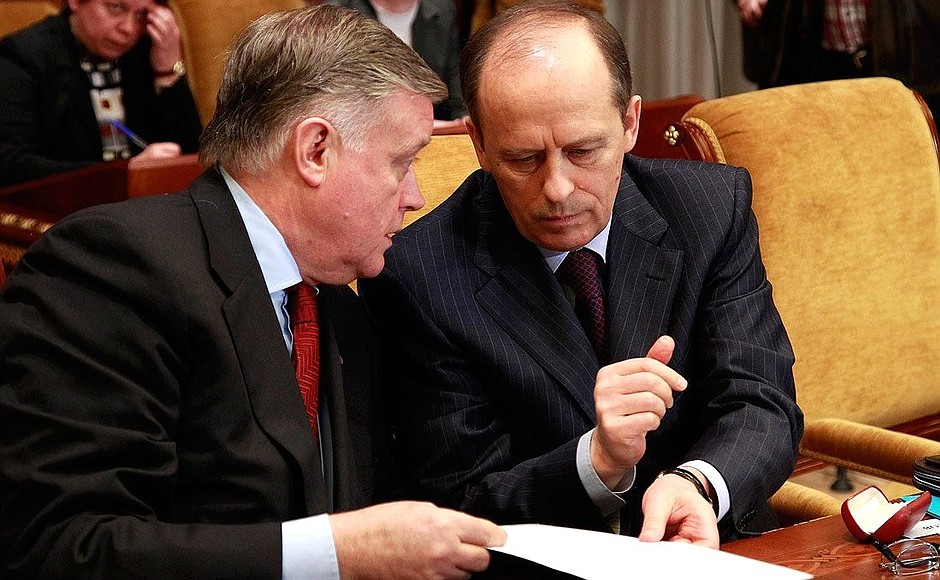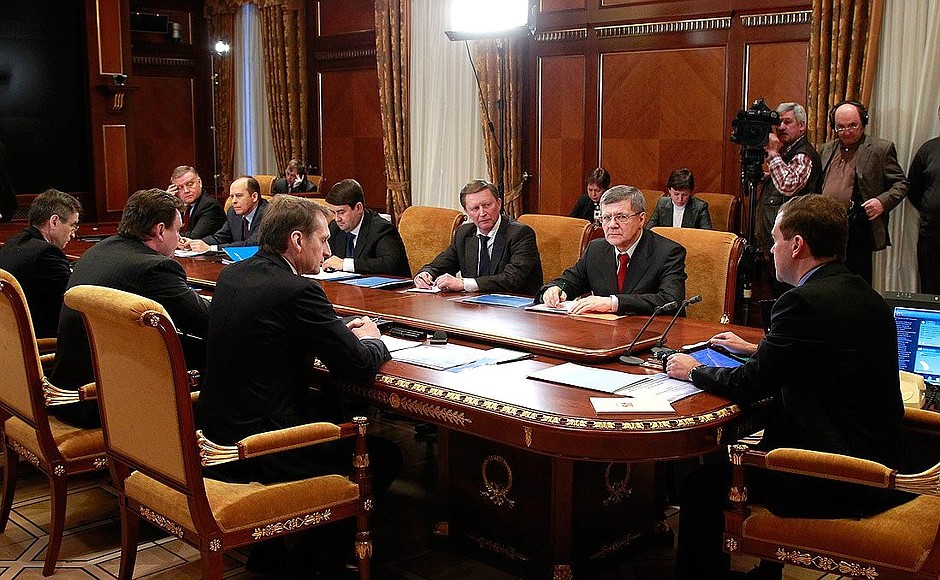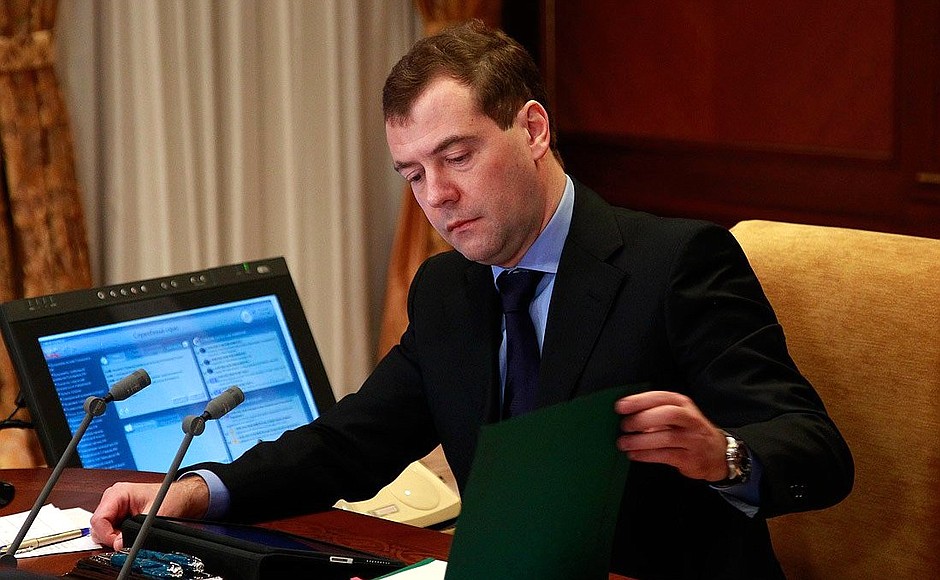Dmitry Medvedev instructed Prosecutor General Yury Chaika to carry out full security checks at all transport facilities as regards their compliance with applicable laws, and ordered Interior Minister Rashid Nurgaliyev to ”shake up“ the entire transport police. The President also instructed the Government to draft transport security proposals in two weeks.
* * *
President of Russia Dmitry Medvedev: Colleagues, I have brought you together to give a more detailed assessment of our transport security.
Yesterday, I gave a speech at the expanded meeting of the Federal Security Service board, so I have already said certain things. I feel that overall, our current level of transport security is unsatisfactory (and not just because of the terrorist attack that took place). We need to analyse the causes that led to the tragedy at Domodedovo Airport, but what’s most important right now is to ensure that tragedies of this kind are not repeated, and to do everything we can, because naturally, protecting transport facilities is a very complicated task. In countries that have to deal with terrorism – and this is a large number of nations – transport facilities are among the most vulnerable targets. But at the same time, there are subjective things we should pay attention to.
I would also like to hear about how transport legislation is being fulfilled and what additional measures we should take to minimise noncompliance with such legislation, thus minimising the terrorist threat at transportation facilities and protecting people.
In March of last year, I issued an Executive Order to equip the most vulnerable facilities and means of transport with specialised technical devices, devices for maintaining safety, public warning and information systems. By 2014 we must create an integrated transport security system to prevent emergencies and terrorism and take a number of other measures. This is not a programme that can be carried out in a day. I would like for you to brief me on how work on this Executive Order is progressing, what has already been done, and what problems have occurred. One of the items addresses the integrated public transport security programme. In July of last year, this programme was approved by the Cabinet, and the Finance Ministry allocated money for it. What has been done?
Let me remind you of another thing. In 2007 (after terrorist attacks on flights leaving from Domodedovo Airport), a federal law on transport security was passed. I recall how we worked on it (I was working in the Presidential Executive Office, and later in the Cabinet). Somewhat later, a whole set of bylaws came into force. Overall, this was an adequate regulatory foundation for evaluating the vulnerability of transport infrastructure facilities. The law sets forth categories and criteria for rating corresponding facilities and introduces various levels of security. In addition, transport infrastructure entities must adopt safety plans. I would like to know what has been done. Mr Chaika [Yury Chaika, Prosecutor General], we need to check our major transport facilities to see whether they comply with the law on transport security. I even think that the corresponding plans have been developed, but the question is whether these plans are actually being carried out. I spoke about this yesterday.
Based on data from the Prosecutor General’s Office and the Presidential Control Directorate, not all legislative provisions are being adhered to, to put it lightly. The number of general violations is growing; they are increasing for nearly every type of transport. Right now, I am speaking not only about air hubs, but also railroads and bus stations. Unfortunately, this is happening across the board. Regardless of whom I speak to, people say the following: after a terrorist attack, in many cases, metal detectors were put in use at transport facilities; they worked in the beginning, with everyone being sent through them; but then everything stopped – people could come and go as they pleased. Police officers stationed at major transport hubs, airports and railroad stations are acting entirely passively. In the best case, they hassle migrants to check their registration papers and thereby make use of their powers.
This is the work we need to do on a daily basis, every day – the same way it is done in nations that face a very significant terrorist threat (I spoke about this yesterday), and not just from time to time. Only then will we see a difference.
I do not want to make assumptions about the results of the prosecutors’ large-scale inspection, which is already underway, but I can say that public officials (here I am addressing the Transport Minister, the Cabinet in general, the Russian Railroads management, and the Minister of the Interior) – all public officials responsible for organising the process must wake up and get to work, and those who did not work must be punished accordingly.
I would like to let you know that in accordance with the instructions I gave yesterday during the FSB board meeting, I have just signed an Executive Order on relieving head of the Interior Ministry’s transport police department for the Central Federal District Andrei Alekseyev from his duties. But that’s not going to be all. These are high-level officials. Mr Nurgaliyev, what else is being suggested?
Minister of The Interior Rashid Nurgaliyev: There have been blunders in protecting and maintaining public order, lack of control over the line of duty, and low level of operational awareness regarding potential acts of unlawful interference in the work of airports. As a result I have also taken organisational measures: head of line police division at Domodedovo Airport and two of his deputies have been fired.
”Areas where large numbers of people gather and their protection should be the subject of close attention by law enforcement agencies as well as transport authorities.“
Dmitry Medvedev: The entire transport police should be shaken up. If people don’t understand how to work, we will find other people.
Control has to be an everyday measure. Unfortunately, it has to be compulsive; otherwise, we simply will not achieve the goals we are setting for ourselves. Every one of us knows how we communicate with police or transport service officers at some airports or train stations abroad. Sometimes, as freethinking people, it irritates and annoys us: they force us to open every suitcase, they make us undress. But that is the only way we can reach results. We will have to change the rules, as I said yesterday: the Cabinet must draft relevant proposals in two weeks.
I would like to once again emphasise that we are talking about security for all forms of transport. At the same time, security at air hubs is one of the most complicated issues. Indeed, terrorist attacks have happened not only in Russia but in other nations as well, and in other airports, but that doesn’t mean that we should fold our arms and say that things like that cannot be fully controlled.
We cannot forget about entrances to airports, train stations, parking lots, and areas adjacent to the airport. All of these are areas where large numbers of people gather, and their protection should be the subject of close attention by law enforcement agencies as well as transport authorities. And I do not want to ever hear the heads of major transport companies say ‘That’s not our responsibility, that’s the duty of the police or someone else.’ If people in charge of transport organisation think like that, that is completely and utterly immoral. In fact, this is something the law-enforcement agencies should look into. Yesterday, the Investigative Committee initiated a criminal case; they will check who was working and how during this period.
There is one last thing I would like to say. What’s most important is for transport companies and law enforcement agencies not to relax. I already spoke about this yesterday at the board meeting, and I want to repeat it here. Unfortunately, security measures work only at first, while later heads of transport companies and everyone working for transport companies and, to a certain degree, the public go totally lax. Therefore, in the face of a terrorist threat, we need to stick together and act in a consolidated manner. This is also something we must absolutely pay attention to.
Thus, we must come up with a much more active alert system at airports, in the metro, and at train stations. These are unpleasant things. People want positive emotions, including while they are travelling. But we need to talk about it using overhead screens and loudspeakers – we must talk about the terrorist threat, telling everyone to stay alert. We need to come up with a modern work programme. We planned to implement something of this kind in the metro, as far as I understand, but even there, nothing has come of it yet. Please do it.
<…>


